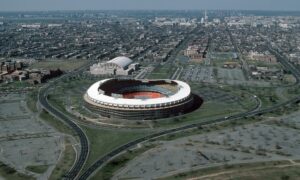As the Washington Commanders consider a move back to the hallowed-ground that is the RFK site, the journey is fraught with financial challenges. Securing control of the federal land is just the first step; the District of Columbia must also address the substantial cost of building a new stadium amid rising debt levels.
The recent history of football stadiums shows a pattern of heavy taxpayer involvement. Cities like Jacksonville, Chicago, Tennessee, and Buffalo have all committed hundreds of millions of dollars to support their teams. Jacksonville alone agreed to a $775 million renovation for the Jaguars, while Tennessee lawmakers allocated $1.2 billion for a new Titans stadium.
Commanders owner Josh Harris will likely need significant financial support from D.C. However, the District’s financial situation complicates matters. According to projections from D.C.’s chief financial officer, the city’s debt could exceed $1.7 billion by 2030. This includes the recent $520 million investment in Capital One Arena to retain the Wizards and Capitals. Consequently, D.C. faces a legal limit on its borrowing capacity.
Jack Evans, a former D.C. Councilmember who played a crucial role in the financing of Nationals Park, suggests that there are alternative approaches to consider. Evans’ consulting firm was involved in a $400,000 study to explore feasible funding models for a new Commanders stadium. Although completed in March, the results have not yet been released.
Evans argues that sports stadiums can be lucrative for cities despite some economists’ skepticism. He points to Nationals Park’s success in revitalizing the Navy Yard area and its accelerated debt repayment. According to Evans, a domed football stadium could offer year-round benefits, making it a worthwhile investment for D.C.
“I would say the overall conclusion is that sports stadiums actually produce enormous revenue for the cities,” Evans said. “You’ll have economists say it never does anything, and in some cities it doesn’t.”
One financing strategy under consideration is the creation of a special taxing district around the RFK site, known as Tax Incremental Financing (TIF). This method would use a portion of the revenue generated from the area to pay off the stadium’s costs over time without impacting the city’s debt limit. If this approach isn’t viable, D.C. would have to divert funds from other planned capital projects.
“There’s so much that a domed football stadium can do for a jurisdiction,” Evans said.”If we are going to do this, that is what we absolutely should do. Because you can use it year-round.”
The Office of D.C.’s Chief Financial Officer notes that current debt figures represent a “snapshot in time” and that the city’s borrowing capacity could evolve in the coming years.
The Commanders continue to evaluate potential sites in Maryland and Virginia in addition to the RFK site.
[Image via Daw Swimm/Getty Images]




















